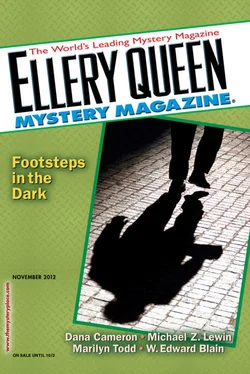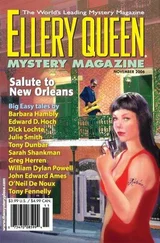W. Blain - Ellery Queen’s Mystery Magazine. Vol. 140, No. 5. Whole No. 855, November 2012
Здесь есть возможность читать онлайн «W. Blain - Ellery Queen’s Mystery Magazine. Vol. 140, No. 5. Whole No. 855, November 2012» весь текст электронной книги совершенно бесплатно (целиком полную версию без сокращений). В некоторых случаях можно слушать аудио, скачать через торрент в формате fb2 и присутствует краткое содержание. Город: New York, Год выпуска: 2012, ISBN: 2012, Издательство: Dell Magazines, Жанр: Детектив, на английском языке. Описание произведения, (предисловие) а так же отзывы посетителей доступны на портале библиотеки ЛибКат.
- Название:Ellery Queen’s Mystery Magazine. Vol. 140, No. 5. Whole No. 855, November 2012
- Автор:
- Издательство:Dell Magazines
- Жанр:
- Год:2012
- Город:New York
- ISBN:ISSN 0013-6328
- Рейтинг книги:4 / 5. Голосов: 1
-
Избранное:Добавить в избранное
- Отзывы:
-
Ваша оценка:
- 80
- 1
- 2
- 3
- 4
- 5
Ellery Queen’s Mystery Magazine. Vol. 140, No. 5. Whole No. 855, November 2012: краткое содержание, описание и аннотация
Предлагаем к чтению аннотацию, описание, краткое содержание или предисловие (зависит от того, что написал сам автор книги «Ellery Queen’s Mystery Magazine. Vol. 140, No. 5. Whole No. 855, November 2012»). Если вы не нашли необходимую информацию о книге — напишите в комментариях, мы постараемся отыскать её.
Ellery Queen’s Mystery Magazine. Vol. 140, No. 5. Whole No. 855, November 2012 — читать онлайн бесплатно полную книгу (весь текст) целиком
Ниже представлен текст книги, разбитый по страницам. Система сохранения места последней прочитанной страницы, позволяет с удобством читать онлайн бесплатно книгу «Ellery Queen’s Mystery Magazine. Vol. 140, No. 5. Whole No. 855, November 2012», без необходимости каждый раз заново искать на чём Вы остановились. Поставьте закладку, и сможете в любой момент перейти на страницу, на которой закончили чтение.
Интервал:
Закладка:
Ellery Queen’s Mystery Magazine. Vol. 140, No. 5. Whole No. 855, November 2012
The Charles Dickens Mystery
by W. Edward Blain
Charles Dickens’ 200th birthday is being celebrated with fanfare in England and many other places this year. Born on February 7, 1812, Dickens is often claimed as one of our own by the mystery community for his creation of characters such as Fagin, “receiver of stolen goods,” and books such as The Mystery of Edwin Drood. Woodberry Forest School teacher and writer W. Edward Blain will be taking eleven of his students to the Dickens House Museum in July in honor of the Dickens bicentenary.

When the police arrived at the Dickens House Museum in London, the body of Ravi Vikram sprawled on the floor of the small bedroom, head against the wall, eyes still open, rope marks still visible on his neck. Driscoll Henley stood nearby, the purple velvet rope used for the strangulation now dropped by his feet. Within minutes the police advised Henley of his rights and handcuffed him, but before they could lead him downstairs to the waiting police car, he protested.
“I’m telling you that I’m a teacher, not a killer,” he said. “Call the head of my boarding school in the United States. She’ll vouch for me.”
“Will she?” said the inspector, a tall man in a brown jacket. “Your hands were on his throat.”
“I was removing the rope,” said Henley. “I was trying to resuscitate him.”
“We can discuss it in good time,” said the inspector. “For now, Mr. Henley, you are under arrest for the murder of Ravi Vikram, actor.”
“Give me five minutes,” said Henley. “While everybody is still here in the building. Five minutes.”
“Why should I do that?” asked the inspector.
“Because I have one advantage over you,” said Henley. “I can eliminate myself as a suspect.”
“You know who killed this man?”
“Five minutes,” said Henley.
The inspector looked at his watch. “Starting now,” he said, and Driscoll Henley desperately began to think. He had no idea who had murdered Ravi Vikram, but he needed to find out during the next four minutes and fifty-eight seconds.
Henley’s ordeal began six months earlier, when Suzanne McClain, the head of Foxborough Hall, summoned him to her paneled office. “How would you like to spend a month in London?” she asked him. “All expenses paid by the school?”
He was delighted by the offer, but he didn’t answer right away. School heads don’t make such offers without ulterior motives.
“There’s a catch, of course,” she said, reading his face, if not his mind. “You have to solve a mystery.” She smiled, and her green jacket set off her red hair in a way that always reminded him of Maureen O’Hara in a John Wayne movie.
“The mystery of the coy headmistress?” he asked, smiling in turn.
“The mystery of Charles Dickens, the playwright.”
Had he misunderstood her? “Dickens was a novelist, not a playwright.”
She shook her head. “He loved the theater all his life. He performed in plays and directed them throughout his career. He mounted four plays successfully in London before he published a novel. Why didn’t Charles Dickens become the great Victorian playwright? That’s what I want you to find out.”
He realized that she was serious. “I’ll do my best,” he said eventually. “But why?”
“Because a prominent alumnus with a passion for Dickens has offered to build a new arts center if someone on the faculty can explain satisfactorily the great writer’s career switch.”
“Wasn’t it simply a matter of money? Playwrights don’t earn much.”
“Our donor doesn’t find that explanation sufficient. You need to saturate yourself in Dickens, come back here, meet with the man, and offer a plausible narrative for why Dickens stopped writing plays. Do that, and I’ll be grateful.”
It had sounded so manageable in January. Now, on a Wednesday in June, he was suspected of murder. How could the day have gone so wrong? It had started auspiciously enough. He had been full of confidence at nine-thirty a.m. as he had tossed a solitary apple into his briefcase and walked from his flat in Russell Square to Doughty Street, a sunny Bloomsbury thoroughfare. The Dickens House Museum sat in a block of modest townhouses nearly indistinguishable from one another: drab brick, unadorned rectangular windows, arched doorways.
Inside the museum a thin woman standing behind a glass counter smiled when he introduced himself.
“I’m Mrs. Pierce,” she said. “You’ll be wanting the director, won’t you?”
“Yes, Mr. Jarvis Dedlock,” said Henley.
She shook her head. “I’m afraid you just missed Mr. Dedlock. He’s been sacked.”
“What?” Henley had exchanged e-mails with Jarvis Dedlock for the past three months in order to arrange on-site research.
She leaned forward to stage-whisper the rest. “Valuable items from the collection have gone missing.”
“And Mr. Dedlock is responsible?”
Mrs. Pierce, clearly enjoying her role as bearer of sordid tidings, shook her head. “Mr. Dedlock assures me that the thief is still among us. Mark my words, Mr. Henley. Jarvis Dedlock is as innocent as a lamb.”
Henley was primarily concerned with whether the archives would still be available to him. Mrs. Pierce reassured him that all would be well. “The new director is Mr. Thatcher Finn. He’s in conference at the moment, but I’ll alert him that you’re here. Would you care to enjoy the exhibits while you wait?”
He retreated contentedly enough into what had been the Dickens family’s dining room. His rubber-soled walking shoes were silent on the hardwood floors. There was little furniture. Locked glass cabinets held displays of Dickensiana — letters, manuscripts, reviews, first editions. Henley gravitated to an exhibit of a magazine called Household Words.
“He published nearly everything in periodicals first, you know,” said a voice behind him. He turned to face the speaker and beheld, to his surprise, someone who looked like a fifteen-year-old surfer: blond hair in a choppy mullet, white T-shirt advertising Pimm’s, pedal-pusher trousers that fell halfway between kneecap and ankle, and flip-flops.
Behind this young man was an older gentleman wearing waistcoat, pince-nez, and watch chain. His diaphanous white hair lifted off his head to form a halo in the doorway, and he smiled politely at the assertiveness of the chatty young man. Henley could not have conjured a more Dickensian director for the Dickens House Museum than the man in the doorway, who had just enough of a belly to qualify as generously proportioned but not quite enough for portly.
“Mr. Finn, I presume,” said Henley, artfully dodging the young man, crossing to the chap in the doorway, and extending his hand. But the plump gentleman blushed.
“Right here, Mr. Henley,” said the young man. He stood with hands in his pockets and one foot crossed over the other. “But please meet Mr. Ravi Vikram. He works for us.”
Henley required a few moments to recalibrate his assumptions. Thatcher Finn, the director of the Dickens House, was this... this slacker? And the gentleman who looked exactly like Pickwick had an Indian name?
Ravi Vikram, who appeared to be in his mid fifties, extended a hand for Henley to shake. “Hope to see you at the show,” he said, and when Henley looked puzzled, he added, “In the parlor. This evening.”
“Mr. Vikram plays Dickens in a weekly performance,” explained Thatcher Finn. “Every Wednesday night in the parlor. Including tonight.”
Читать дальшеИнтервал:
Закладка:
Похожие книги на «Ellery Queen’s Mystery Magazine. Vol. 140, No. 5. Whole No. 855, November 2012»
Представляем Вашему вниманию похожие книги на «Ellery Queen’s Mystery Magazine. Vol. 140, No. 5. Whole No. 855, November 2012» списком для выбора. Мы отобрали схожую по названию и смыслу литературу в надежде предоставить читателям больше вариантов отыскать новые, интересные, ещё непрочитанные произведения.
Обсуждение, отзывы о книге «Ellery Queen’s Mystery Magazine. Vol. 140, No. 5. Whole No. 855, November 2012» и просто собственные мнения читателей. Оставьте ваши комментарии, напишите, что Вы думаете о произведении, его смысле или главных героях. Укажите что конкретно понравилось, а что нет, и почему Вы так считаете.












